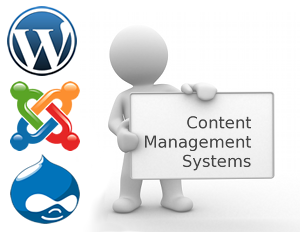Which CMS is right for you...?
Posted on 05
Advanced PHP online/classroom course, hyderabad: We Global I-Matrix Software Solutions are one of the best Web designing and development company in Hyderabad, India. If your search is for trust worthy developer then choose the best from our company. For more details Call Us 9000866292.mail us at : info@imatrixsolutions.com

Features of DRUPAL, JOOMLA, WORDPRESS and benefits of them :
Every IT person, developer, and programmer has an opinion when it comes to the various open source content management systems out there. It often comes down to functionality and ease of use, but even then the lines are often blurred and there is rarely a clear-cut victor. WordPress vs Drupal vs Joomla – Which is really the king of open source CMS?
Which CMS is right for your Website?
It's a difficult question to answer. Apples and oranges are both fruit, but it's hard to quantify one feature or another that makes either better.The same holds true for Joomla, Drupal and WordPress. These three are Open-source CMS. It's easy for site creators to be passionate about one CMS or the other, but from the outside looking in, it really looks like an apple and oranges comparison
If you want a blog or only some web pages with mainly text, like an 'about' page: use Wordpress, and preferably spend a bit of time or money on the theme so your site won't look like a web template.
If your site content needs structure beyond a page title and some paragraphs of text, and if it changes frequently (availability of holiday apartments in different locations, used cars for sale, etc) use Drupal, Joomla or a similar CMS
popular quotes...
"WordPress is ideal for blogs, simple sites and uncomplicated ecommerce systems."
"Joomla is more suited to more complicated websites, but requires a greater understanding."
"DRUPAL, utilised by the BBC, is the most adaptable CMS, however it is not intuitive and is difficult to start with."
Features of WordPress - its weaknesses and advantages:
WordPress was created as a blogging platform and should be used primarily for blogs—although small personal sites work as well. It is the best platform for beginner users with its clean interface and easy-to-use menu, tools and plugins. And although it is limited in its native scope it has plenty of plugins to add functionality (although beware using too many as it will slow the site down).
Weaknesses: Navigation is best suited for categories and tags rather than pages. Plugins do not always work in harmony. Template structure relies on multiple files, making updates a bit harder.
Best for:
- Blogging
- Any non-ecommerce project
- Users of any level
Features of Joomla - Its weaknesses and advantages:
Joomla covers the middle ground between Drupal and WordPress and is designed for beginner to intermediate users who want to use their imagination and best out of the cookie-cutter functions of WordPress. It is a great blend of Drupal-like functionalities with WordPress-like ease of use.
Weaknesses: The default themes are weak and poorly optimized. Like the other platforms, it is best handled by a developer/team that has expert knowledge of the pitfalls.
Best for:
- Larger websites
- Multi-language websites
- Experienced developers
Features of Drupal - Its advantages:
Drupal is by far the best solution…if you have the technical know-how. If you are not an advanced user of CMS solutions then you will need to make a serious time commitment to learning the system, which is possible due to their rocking documentation. This is also the best choice for high-traffic and hierarchically complex sites.Weaknesses: installation/configuration of core functionality and add-ons is not straightforward.
Best Use Cases for complex, advanced and versatile sites; for sites that require complex data organization; for community platform sites with multiple users; for online stores
Drupal best in...
Documentation
Drupal by far has the best documentation, which is not a surprise given that it was built by and for developers—who are sticklers for documentation. Wordpress has practically no documentation, and the bit that exists is most likely out-of-date. Joomla, as-per-usual is stuck in the middle, although still does not have much out there.
Winner: Drupal—by a mile.
Loser: WordPress
Loading Time
Drupal has seriously fast loading times and is easily winner in this category. WordPress is also fast—until you install too many plugins (and no one has figured out this exact number yet). Joomla is by far the slowest of the three with famously slow load times.
Winner: Drupal
Loser: Joomla
Scalability
Drupal is by far the most scalable as it is designed to add new elements and sections throughout the design and maintenance process. Joomla offers decent scalability as pieces can be added later, while with WordPress it is extremely difficult to add anything new once a site is complete.
Winner: Drupal
Loser: WordPress
Security
WordPress was plagued with security problems circa 2007 but seems to have sorted these out; it currently has some security issues with its third-party plugins. Joomla had some issues with spam links in 2009. Which makes Drupal the most secure as it has had the least problems to date.
Winner: Drupal
Loser: WordPress
